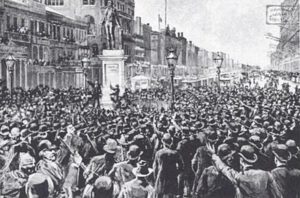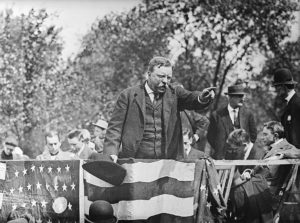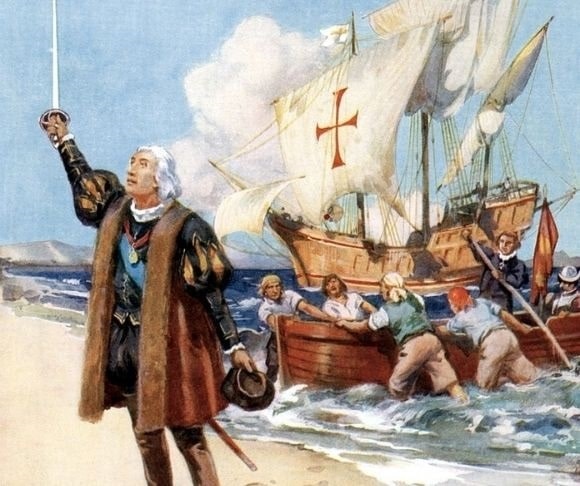We all know the history of Columbus Day: an Italian explorer funded by the Spaniards to find a better trading route who is credited with discovering, by mistake, what we now call America. For centuries, Christopher Columbus and his “discovery” have been celebrated in the U.S. However, in recent years, there have been protests against the explorer who was shipped back to Spain in chains. There are movements across the nation to instead celebrate the second Monday in October as Indigenous Peoples’ Day, and others who think it should be dedicated to Italians. But the first time the holiday became an official national event to celebrate Columbus was not designed to honor the man, but to serve as a political move during a re-election campaign.
Celebrated by Italian and Catholic communities, the first known Columbus Day festivities were staged in 1792 by the New York Columbian Order, also known as Tammany Hall. It didn’t become an official national holiday until 1892 when President Benjamin Harrison issued a proclamation to mark the 400th anniversary of Columbus’ voyage. He wrote:
“On that day let the people, so far as possible, cease from toil and devote themselves to such exercises as may best express honor to the discoverer and their appreciation of the great achievements of the four completed centuries of American Life.”
However, honoring Columbus was not the true objective. Instead, the then-president sought to resolve a diplomatic crisis with Italy and hoped to gain support from Italian American voters after the lynching of Italian immigrants the year before caused a falling out with Italy.
 In March 1891, six Italian immigrants were acquitted of allegedly murdering a local police chief in New Orleans. It was rumored that the jurors had been bribed by powerful Italian families, who were becoming known as the mafia. The morning after the hearing, thousands of people descended on the Orleans Parish Prison where six of the defendants as well as 13 other Italian suspects were being detained.
In March 1891, six Italian immigrants were acquitted of allegedly murdering a local police chief in New Orleans. It was rumored that the jurors had been bribed by powerful Italian families, who were becoming known as the mafia. The morning after the hearing, thousands of people descended on the Orleans Parish Prison where six of the defendants as well as 13 other Italian suspects were being detained.
The New Orleans Times-Democrat reported that the mob started chanting, “Bring ‘em out, we’ll kill ‘em.” A group of armed men was able to break into the jail and shoot dead nine of the prisoners – one of the victims had 42 bullets in his body, the newspaper reported at the time. “The mob took two others to the city square, when one man was hanged on a lamp post and another on a tree,” read the article, which ran under the title “Avenged.”
Italian immigrants at the time were highly discriminated against and the media outlets reflected those feelings in their articles. The Associated Press said:
“It was not an unruly midnight mob. It was simply a sullen determined body of citizens who took into their own hands what justice had ignominiously failed to do.”
The New York Times wrote:
“[W]hile every good citizen [would agree that] this affair is to be deplored, it would be difficult to find any individual who would confess that privately he deplores it very much.”

Theodore Roosevelt
Even Theodore Roosevelt, a U.S. Civil Service commissioner at the time, didn’t condemn the slaughter, writing to his sister that, “Personally, I think it a rather good thing.”
Obviously, this did not go over well in the Italian communities, both in America and in their homeland. Italy ended diplomatic relations and recalled its ambassador. There was even talk of war brewing. It wasn’t until December that Harrison finally spoke against the murders, describing them as “a most deplorable and discreditable incident” and an “offense against law and humanity.”
In April, President Harrison agreed to Italy’s demand to pay indemnity to survivors of three of the victims who were Italian citizens. But it was an election year and Harrison was up against former president Grover Cleveland, whom he had defeated in 1888. Somehow, he had to gain the support of the Italian community. The Brooklyn Citizen wrote:
“… the approaching Presidential election and the necessity the President feels under of repairing his political fences in every direction … He does not want to have the Italian vote massed against him.”
 Although diplomatic relations with Italy resumed, the Italians were upset that the U.S. had yet to prosecute any of the mob members.
Although diplomatic relations with Italy resumed, the Italians were upset that the U.S. had yet to prosecute any of the mob members.
Harrison met with Francis Bellamy, who encouraged a national holiday to promote patriotism among schoolchildren and had written “The Pledge of Allegiance” for that meeting. Liking the idea, Harrison took it to Congress which passed a resolution for a one-time holiday to celebrate Columbus on Oct. 21, to “impress upon our youth the patriotic duties of American citizenship.”
Columbus Day did not become a national holiday officially until 1934, after the Knights of Columbus lobbied Congress and President Franklin D. Roosevelt approved. The second Monday in October was declared the specific holiday in 1971.
~ Read more from Kelli Ballard.




